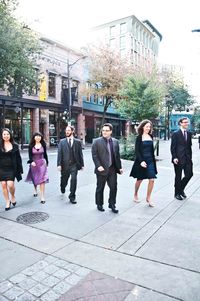
 |
 |
|
Date and Venue May 24, 2015 at 7:30pm | VSO School of Music’s Pyatt Hall Reviewer Ed Farolan The concert featured original musical works by British Columbia composers (Jason Paul Hayward, Maren Lisac, Alexander Jang, Danny Webb, Lucas Oickle, Andre Pinto, Thomas Weideman, David Storen and Nova Pon.) Just as there are those who go for classical music, there are also those who go for new wave music, as this concert displayed. This improvisational ensemble, The Ethos Collective is a Vancouver-based new music ensemble comprised of flute (Samantha Fu), cello (Stefan Hintersteininger), violin (Kathryn Emiko Lee), piano (Chris Morano), and percussion (Katie Rife and Timothy Van Cleave).. The collective places a strong emphasis on improvised music, and although the ensemble is composed of highly trained classical musicians, they like doing this kind of anti-classical dissonant music perhaps to get out of the discipline of classical music and express improvisational freedom. I noticed that despite the concept of improvisation, they played as an ensemble, with notes, and I guess the idea is, like improvisational theatre, improvise as you go along but retain some kind of discipline in order to play as one orchestra. I didn't quite like the compositions, except the last one, Pon's Artichoke, which came close to being harmonious. Lisac's composition just the hipbones and the fingers was an example of dissonance. Just from the description alone, you could tell it was going to be rambunctious, noisy and undisciplined, And it was. Then you had Jang's any three players in the opposite extreme: hrdly audible, very soft, sleepy-like and slow. Webb's Rondo was an expression of frustration, and in the overhead screen, he expresses this with sentences like "I scream out!", "Why am I jailed in this torment?", "I've done nothing!",and a resigned "Surrender to Him". Again, this composition was restless, distorted, noisy and screechy. Pinto's Dolmen Dusk was another example of this loud distorted music and described in the programme as "a 15-page long graphical open score where each page consists of layering 3 acetate papers". I don't understand this and neither would any common man. I guess these nouveau musicians obviously do. The next piece, Weideman's diaristic cinema, was similar to Jang's in that it was quiet, inaudible and sleepy-like. Storen's Toward a Point sounded pointless, and from the description that this piece "came into existence quite suddenly" describes the improvisational nature of the composition. Thus, the music presented either made you go to sleep or irritated you. The saving grace is that this is the kind of music that can be used for horror films or experimental films. Just as you have paintings that are landscapes and portraits where you see reality as it is, there are also those that are abstract, like the paintings of Picasso or Pollock. Like life that has its ups and downs, this music expresses the negative aspects of like as contrasted to the peace and harmony of the more disciplined works of the classics of Beethove, Brahms and Bach. © 2015 Ed Farolan
|
||||||||||||||||||||||||||||||||
|
|
||||||||||||||||||||||||||||||||||
|
|
||||||||||||||||||||||||||||||||||
|
|
||||||||||||||||||||||||||||||||||